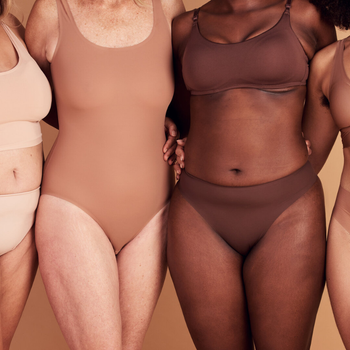New to the whole menopause thing? You’re not alone: About 1.3 million women become menopausal each year. This major life change often forces people to come to terms with any number of surprising symptoms, from vaginal dryness to chills to thinning hair. But the one that truly stinks? Menopause body odor.
If your entry into menopause has you dealing with menopause body odor, you may have questions about what’s altering your body’s smell, how to manage it, and when it’s time to see your doctor. Don’t worry, these questions are all completely valid. You deserve better answers than just “wear a better deodorant,” which is why we’re here to help.
What Causes Body Odors During Menopause?
If you start noticing that you smell a little different now that you’re approaching menopause, it may be due to a number of (perfectly normal) symptoms, including hot flashes, night sweats, and increased levels of anxiety.
Hot flashes are a totally natural (if unpleasant) result of hormone level changes in perimenopause and menopause and occur in an estimated 80 percent of women. Research suggests that the overall decline of estrogen makes it harder for your hypothalamus (the part of your brain that regulates functions like temperature, heart rate, and appetite,) to maintain a stable core temperature. This can make you ultra-sensitive to even the slightest changes. If your hypothalamus is under the impression that you’re even a little bit too cold, it reacts with hot flash to compensate. You feel hot, flushed, and sweaty — and with that sweat comes body odor.
You can get hot flashes while you’re sleeping, a phenomenon known as night sweats. As with a daytime hot flash, your body overheats in response to a slight drop in body temperature. This makes you sweat to the point of soaking your sheets and pajamas and may cause body odor.
MenoRelief
Your mental health may also indirectly contribute to more body odor. Excessive sweating is a classic symptom of anxiety, which is common for folks going through perimenopause and menopause. In fact, up to 23 percent of women experience mood changes during the menopause transition and afterwards.
No matter the cause of your sweating, the result is the same. The bacteria that naturally lives on your skin mix with the salt, water, and fat in your sweat, which can result in body odor. If you’re sweating more often than you did pre-menopause, you might notice more you smell…funkier than you used to.
Many of your perimenopausal symptoms will begin to fade in the months following your last period, but some symptoms will continue into menopause (and even post-menopause). Unfortunately, hot flashes (and potentially the body odor that accompany them) typically last for several years after your last period. The National Institutes of Health (NIH) says Black and Hispanic women tend to have hot flashes and night sweats for more years than Asian and white women.
Where Can You Get Body Odor During Menopause?
Human body odor is a normal (albeit annoying) human experience in every stage of life. You can get menopause body odor anywhere you normally sweat, like your armpits and groin. In general, you should always consult a doctor if your sweating disrupts your daily routine, or if you notice that your body odor has significantly changed.
That said, you may notice that you smell in, well, places you’re just not used to smelling bad. During menopause, the drop in estrogen can lead to an increased vaginal pH. Normal vaginal odors are mild or odorless, but if you notice that the smell is “fishy” or stronger in general, it may be time to see your doctor to rule out an infection or other issue.
How to Treat and Manage Menopause Body Odor
Hot flashes and night sweats can’t be 100 percent prevented, but they can be ameliorated by the following:
-
Dress in light, moisture-wicking clothes: Pack away the denim, corduroy, and velvet for now. Instead, opt for light layers made of silk, chiffon, and athletic-wear materials.
-
Upgrade your deodorant. If your armpit sweat is especially intense, consider talking to your doctor about a prescription antiperspirant. (Remember: Deodorants mask odor but they don’t stop sweating.)
-
Drink cold water: Keep a glass of ice water by your bedside table to sip when you’re feeling overheated. And bring a water bottle with you when you leave the house to stay hydrated on the go.
- Place a frozen cold pack beneath your pillow: This way, your head will stay nice and chilled as you drift off to sleep.
- Keep a fan on standby: Whether you’re working from home or just relaxing on the couch, keep the fan a-blowing.
- Consider acupuncture: Some research suggests that weekly acupuncture sessions can help treat hot flashes (although it might be the placebo effect). Acupuncture may also help reduce stress over time, which might help with other bothersome menopause symptoms.
You should also consider avoiding spicy foods, excessive amounts of caffeine or alcohol, and other potential hot flash triggers.
There are some natural remedies and herbs like black cohosh, ginseng, kava, red clover, and evening primrose oil that may help with menopausal sweating (and thus with body odor), although there’s not a ton of research proving how well they work. As with all supplements, make sure to scrutinize the quality, safety, and purity of the product before buying it. Always consult with your doctor to ensure the ingredients won’t interact poorly with other supplements or medications you take.
When to See a Doctor About Menopause Body Odor
If your hot flashes start to get worse, occur more frequently, or are consistently getting in the way of a good night’s sleep, make sure to check in with your doctor for help. And again, if you notice that you’re sweating a lot more or if your odor has significantly changed, it’s not a bad idea to ask a trusted medical source about that, either.
Depending on the severity of your symptoms, your physician may prescribe the following hormone-free treatments:
-
Antidepressants: A specific class of antidepressants known as selective serotonin reuptake inhibitors (SSRIs) may be prescribed by your doctor in a low dose to lessen the severity of hot flashes. It’s less effective than hormone therapy, but can be very helpful for people who don’t want to or can’t take hormone-based meds.
-
Clonidine: This patch is usually used as a blood pressure intervention, but may also help with hot flashes.
-
Gabapentin: This is yet another multipurpose medication that was originally designed to treat seizures, but may also help with hot flashes.
-
Oxybutynin: This drug is typically used to treat overactive bladder, but it can help with hot flashes, too.
If you’re asking yourself if you’re the only one experiencing body odor in menopause, rest assured that you’re not alone. And if your symptoms do start to feel unbearable, don’t hesitate to reach out to your doctor for help. We firmly believe that this time of life doesn’t have to stink.
Sources:
- Avis, N. et al., JAMA Internal Medicine, Duration of Menopausal Vasomotor Symptoms Over the Menopause Transition, April 2015.
- Cleveland Clinic, Body Odor, March 2022.
- Cleveland Clinic, Can Menopause Cause Anxiety, Depression or Panic Attacks?, November 2019.
- Cleveland Clinic, Hot Flashes, March 2022.
- Cleveland Clinic, Menopause, October 2021.
- Cleveland Clinic, Night Sweats and Women’s Health, June 2017.
- Ee, C. et. al., Menopause, Acupuncture for menopausal hot flashes: clinical evidence update and its relevance to decision making, August 2017.
- Ferrari, N., Harvard Health Publishing, Menopause-related hot flashes and night sweats can last for years, August 2020.
- Mayo Clinic, Hot Flashes, August 2021.
- Mayo Clinic, Menopause, October 2020.
- Mayo Clinic, Sweating and Body Odor, October 2021.
- Mayo Clinic, Vaginal Odor, February 2022.
- National Institutes of Health, Hot Flashes: What Can I Do?, September 2021.
- National Library of Medicine, MedLine Plus, Hypothalamus, April 2021.
- Peacock,K and Ketvertis, K, StatPearls, Menopause, February 2022.
- Santen, R. et. al., UpToDate, Patient education: Non-estrogen treatments for menopausal symptoms (Beyond the Basics), October 2021.
- Sparrow, K. and Golinau, B., Medical Acupuncture, Does Acupuncture Reduce Stress Over Time? A Clinical Heart Rate Variability Study in Hypertensive Patients, October 2014.
- The North American Menopause Society, Changes in the Vagina and Vulva, Undated.
- The North American Menopause Society, Depression, Mood Swings, Anxiety, Undated.
- The North American Menopause Society, Five Solutions for Menopause Symptoms, Undated.
- The North American Menopause Society, Natural Remedies for Hot Flashes, Undated.














